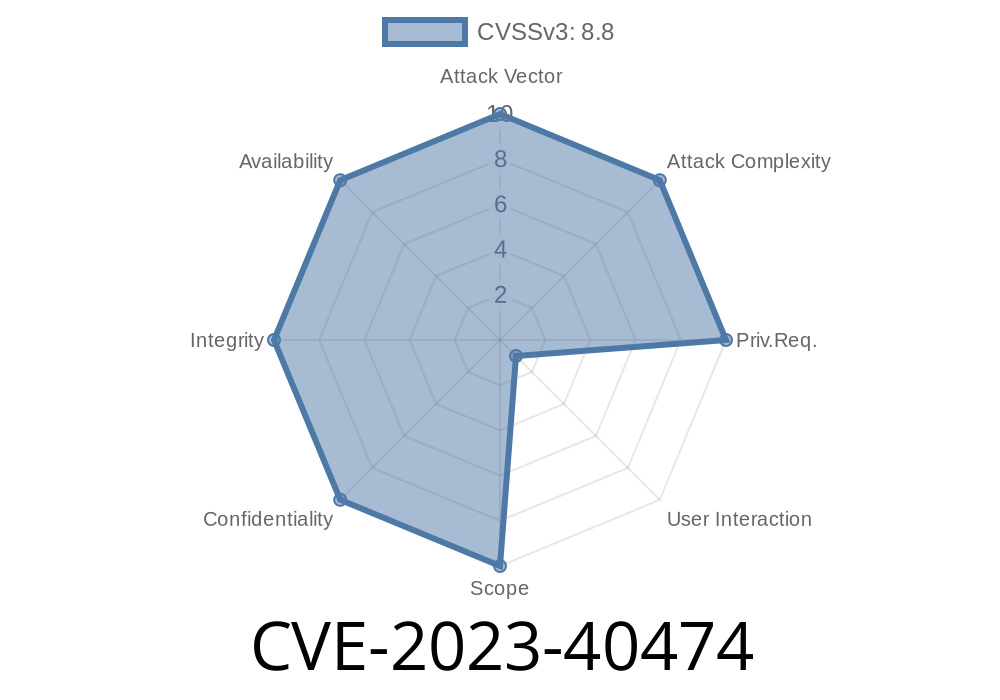GStreamer is a widely-used open source multimedia framework. In 2023, a critical security vulnerability was found that allows attackers to execute arbitrary code just by getting their specially-crafted video file loaded into a vulnerable system. This long-read post breaks down CVE-2023-40474, how it works, how it can be exploited, and how you can stay safe.
What is CVE-2023-40474?
CVE-2023-40474 is a remote code execution vulnerability found in the GStreamer framework, specifically in the parser for MXF (Material eXchange Format) files. It allows attackers to run arbitrary code on a victim’s machine by tricking them into opening or processing a malicious MXF file with a vulnerable version of GStreamer. No user interaction with the file is required beyond whatever loads or scans MXF files (media players, thumbnail generators, background processes, etc).
* Discovered by: Anonymous researcher via the Zero Day Initiative (ZDI-CAN-21660)
* Affected software: GStreamer <= 1.22. (and possibly later versions before patch)
* Attack vector: Malicious MXF video file
* Impact: Arbitrary code execution (RCE) in the context of the process running GStreamer
Original announcement:
https://nvd.nist.gov/vuln/detail/CVE-2023-40474
https://www.zerodayinitiative.com/advisories/ZDI-CAN-21660/
Why Does This Vulnerability Exist?
The vulnerability exists because of improper validation of MXF file fields. GStreamer reads certain size or offset fields from the MXF file and uses them in allocation calculations _without analyzing whether the values make sense_. If a file advertises a gigantic size, an integer overflow may occur, causing the calculation to wrap around and allocate a much smaller buffer than intended. When data is then copied into this too-small buffer, you get a buffer overflow, which is a classic route to code execution.
`
If, for example, length and offset are both x80000000, the sum is x100000000, which wraps to in a 32-bit integer (integer overflow).
Analysing the Vulnerable Code
While every version might differ, the logic is always roughly the same. Here’s a *simplified* reconstructed code snippet to show the vulnerable logic:
// Vulnerable MXF parsing routine in C-like pseudo code:
uint32_t length = read_uint32(file); // attacker-controlled
uint32_t offset = read_uint32(file); // attacker-controlled
// Vulnerable integer overflow
uint32_t total = length + offset;
// Allocate buffer, total may have wrapped around to a small number
uint8_t* buf = malloc(total);
fread(buf, 1, length, file);
// ... later code might trust buffer size, and copy too much
There’s no check for overflows or for whether total is less than either length or offset. An attacker can set length and offset so that their sum wraps around, making total tiny—leading to a small allocation, but later code will copy in a larger amount, corrupting memory.
How is This Vulnerability Exploited?
Scenario:
The attacker crafts a malicious MXF file, hosted on a website or sent as an email attachment. The victim opens or previews it—using any software that relies on a vulnerable GStreamer version.
Crafting the file:
The attacker sets MXF length/offset fields in a way that cause integer overflow upon parsing and calculation.
Heap layout manipulation:
Carefully chosen data after the header allows the attacker to control what is written over the heap, setting up the option for code execution.
Triggering the overflow:
When GStreamer parses and tries to allocate/copy, the overflow is triggered, leading to heap corruption.
Achieving code execution:
With enough control, attacker’s data may overwrite control structures, function pointers, or other process-critical areas, culminating in arbitrary code execution.
Sample malicious MXF header (hex)
80 00 00 00 80 00 00 00
Where x80000000 + x80000000 = x100000000 (in 32 bits, wraps to ).
Potential Impact
- Remote Code Execution: Any context where GStreamer loads media files is vulnerable: media players, media thumbnailers, custom applications, and even background indexing services.
Privilege escalation may be possible if triggered in services running with elevated rights.
- Silent exploitation: No need for user interaction if the affected app auto-indexes or previews files.
Update GStreamer:
Apply official patches as soon as possible. Latest versions include proper checks to prevent integer overflows.
Monitor for malicious MXF files:
Use anti-malware that can scan MXF files for suspicious headers/fields.
Consider disabling auto-preview or auto-indexing for untrusted media files until updated.
Official patches and release notes:
- GStreamer main repo
- Security advisories
Conclusion
CVE-2023-40474 is a classic yet dangerous example of why input validation and correct arithmetic matter, especially with user-controlled media formats. Just opening a video file—no clicks, no scripting—can be enough to give an attacker control over your system if patches are not applied. Always keep multimedia libraries up-to-date, and audit your media stack for vulnerabilities like this.
References
- CVE-2023-40474 - NVD entry
- Zero Day Initiative ZDI-CAN-21660
- GStreamer Official Patch
- GStreamer Security Advisories
Stay safe, update your software, and stay vigilant when processing untrusted media files!
Timeline
Published on: 05/03/2024 03:15:19 UTC
Last modified on: 06/05/2024 20:38:12 UTC
